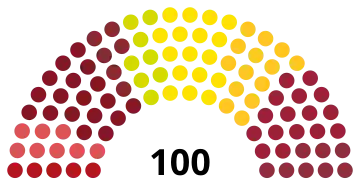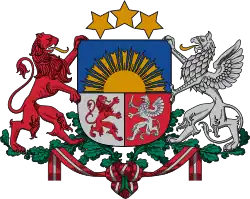1995 Latvian parliamentary election|
|
All 100 seats in the Saeima
51 seats needed for a majority |
| Turnout | 72.65%  (18.53 pp) (18.53 pp) |
|---|
|
This lists parties that won seats. See the complete results below. .svg.png) Results by district |
|
Parliamentary elections were held in Latvia on 30 September and 1 October 1995.[1] The Democratic Party "Saimnieks" emerged as the largest party in the Saeima, winning 18 of the 100 seats.
Results
 |
|---|
| Party | Votes | % | Seats | +/– |
|---|
| Democratic Party "Saimnieks" | 144,758 | 15.22 | 18 | New |
| People's Movement for Latvia | 142,324 | 14.97 | 16 | New |
| Latvian Way | 139,929 | 14.71 | 17 | –19 |
| For Fatherland and Freedom | 114,050 | 11.99 | 14 | +8 |
| Latvian Unity Party | 68,305 | 7.18 | 8 | +8 |
| ZS–LKDS–LDP | 60,498 | 6.36 | 8 | –10 |
| NKP–ZP | 60,352 | 6.35 | 8 | New |
| Socialist Party of Latvia | 53,325 | 5.61 | 5 | New |
| National Harmony Party | 53,041 | 5.58 | 6 | –7 |
| Labour and Justice Coalition | 43,599 | 4.58 | 0 | New |
| Political Union of Economists | 14,209 | 1.49 | 0 | New |
| Latvian Farmers' Union | 13,009 | 1.37 | 0 | –12 |
| Party of Russian Citizens in Latvia | 11,924 | 1.25 | 0 | 0 |
| Popular Front of Latvia | 11,090 | 1.17 | 0 | 0 |
| Political Association of the Underprivileged and Latvian Independence Party | 9,468 | 1.00 | 0 | New |
| Citizens Union "Our Land" – Anti-Communist Union | 5,050 | 0.53 | 0 | 0 |
| Democrats' Party | 2,546 | 0.27 | 0 | New |
| Latvian Liberal Party | 2,163 | 0.23 | 0 | 0 |
| Latvian National Democratic Party | 1,367 | 0.14 | 0 | New |
| Total | 951,007 | 100.00 | 100 | 0 |
|
| Valid votes | 951,007 | 98.52 | |
|---|
| Invalid/blank votes | 14,332 | 1.48 | |
|---|
| Total votes | 965,339 | 100.00 | |
|---|
| Registered voters/turnout | 1,328,779 | 72.65 | |
|---|
| Source: Nohlen & Stöver |
Aftermath
Both parties of government, Latvian Way and Latvian Farmers' Union were punished by the voters, losing a substantial number of seats. With no party able to form a working majority, a new government was formed led by independent Andris Šķēle.
References
- ^ Dieter Nohlen & Philip Stöver (2010) Elections in Europe: A data handbook, p1122 ISBN 978-3-8329-5609-7


.svg.png)